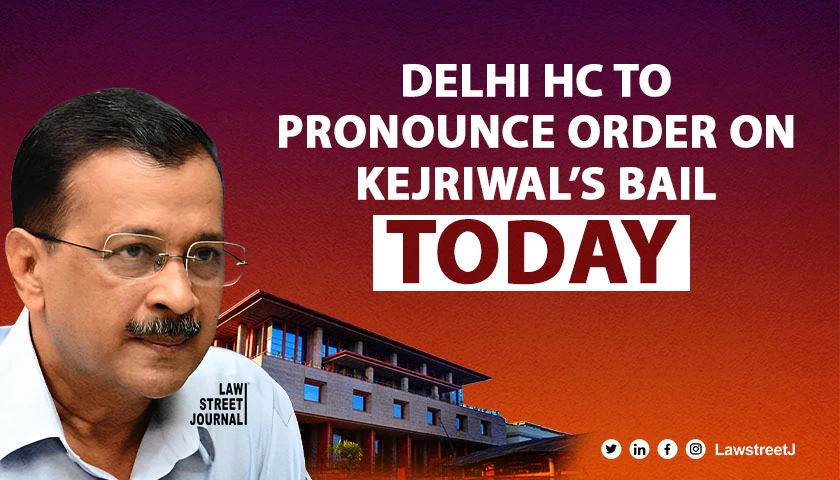New Delhi: The Delhi High Court will pronounce its order on the Enforcement Directorates (ED) plea seeking a stay on the Rouse Avenue Courts order granting bail to Delhi Chief Minister Arvind Kejriwal.
The order will be pronounced at 2:30 pm.
On June 21, the Delhi High Court reserved the order and put on hold the trial courts decision granting bail to Kejriwal until it decides on the EDs plea seeking a stay on the Rouse Avenue Courts order. The High Court stated that it was staying the trial court order for two to three days and reserved its decision on the EDs plea.
Delhi Chief Minister Arvind Kejriwal has moved the Supreme Court against the Delhi High Courts decision to put on hold, for two to three days, the order of the trial court granting bail to him in the liquor policy case. However, the Supreme Court on Monday adjourned the matter to Wednesday, observing that the Delhi High Court would decide in a few days.
The High Courts order came on the EDs plea challenging the trial courts order. The trial court on Thursday granted bail to Kejriwal, observing that the ED failed to provide any direct evidence against him concerning the proceeds of the crime.
However, this fact, among others, was denied by the ED in the Delhi High Court, which called the trial courts order perverse as the lower court did not give the probe agency a proper opportunity to present its arguments.
The ED, justifying its argument against Kejriwal, stated that if an offense is committed by the AAP, the person responsible for its conduct will also be responsible due to the principle of vicarious liability. The probe agency argued that if the AAP has committed an offense and it was done with the consent and connivance of Kejriwal, he shall also be deemed guilty.
The ED argued that the trial courts order had serious procedural irregularities.
On the other hand, Kejriwals lawyer defended the trial courts order and opposed the EDs plea seeking a stay on the order.
In its order copy, the trial court stated, ED is silent on certain issues raised by the applicant (Kejriwal), such as that he was not named either in the CBI case or in the ECIR FIR. The allegations against Kejriwal have surfaced after subsequent statements from certain co-accused, the trial court noted. It further observed that it is an admitted fact that the accused Kejriwal has not been summoned by the court till date, yet he is lying in judicial custody at the instance of the ED on the pretext of the investigation still ongoing.
ED has not shown anything on record that Vijay Nair was acting upon the directions of the applicant. It has also failed to establish that even if Vinod Chauhan has close relations with Charanpreet, how come the same helps ED to establish the guilt of the applicant (Kejriwal), even if the applicant is acquainted with both of these co-accused. ED has also failed to clarify how it concluded that the sum of rupees one crore attached from Vinod Chauhan was part of the proceeds of the crime. ED is also not clarifying how the alleged amount of rupees 40 crores traced out during the investigation forms part of the proceeds of the crime. It seems that ED also believes that the evidence on record is not sufficient to proceed against the applicant and is taking time to procure the same in any manner to convince the court regarding the availability of evidence against the applicant. The investigation agency should be prompt and fair so that it can be perceived that the principles of natural justice are also being followed by the agency, the trial court said in its order copy.
Countering the trial courts decision, the ED argued in the Delhi High Court that Kejriwal is guilty of money laundering on two counts one in his individual capacity for demanding money and the other due to vicarious liability because the AAP is guilty of the offense of money laundering. The ED claimed that the Aam Aadmi Party used this money in the election campaign of AAP candidates and events.
Kejriwal was arrested by the ED on March 21 in connection with a money laundering case relating to alleged irregularities in the liquor policy case. However, he succeeded in getting interim bail from the Supreme Court on May 10 in view of the Lok Sabha polls. He surrendered on June 2 after the expiry of his interim bail period.







![Delhi High Court Sets Aside Arbitral Tribunal's Award Against NHAI in Highway Project Delay Case [Read Judgment]](/secure/uploads/2023/07/lj_9605_23374c2e-392c-4491-a2fe-f2f12fc5272f.jpg)
![Delhi Court Rejects Stay Request in Defamation Case Against Rajasthan CM Ashok Gehlot [Read Order]](/secure/uploads/2023/08/lj_5208_80de1ddc-d76a-4f7f-b180-408e3ae14fb4.jpg)





